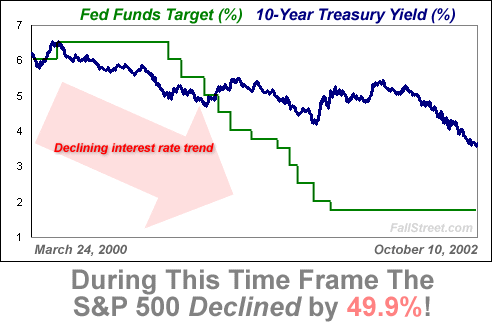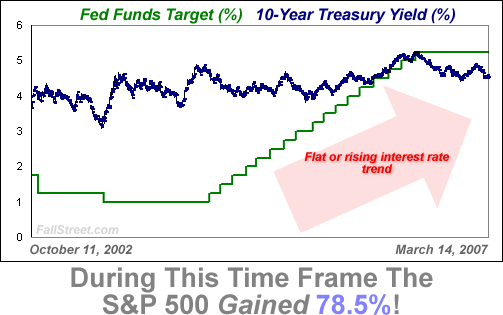|
March 15, 2007
The First Cut May Not Be The Deepest
As the equity markets sold off yesterday the odds of a Fed rate cut by June jumped as high as 56% (MW - Fed Fund Futures). Despite Wall Street’s eagerness to start touting ‘don’t fight the Fed’ misnomers, there is reason to believe that the first Fed rate cut in almost four years would simply provide further evidence that the good times are over.
To begin with, if the Fed is going to cut interest rates by June it will likely be in response to more negative economic/financial market developments. Thus, on a basic level being overweight stocks ahead of these ‘developments’ is a horrible idea. As for the argument that a Fed rate cut would be positive news for stocks because it will provide more ‘liquidity’ to the markets, this myopic viewpoint neglects to point out that the carnage started in subprime is not the result of monetary tightness but of overly loose lending standards and/or excessive ‘liquidity’. In other words, it is highly unlikely that if investors continue to turn more risk averse because of isolated financial market tightness that the Fed can instantly restore confidence (yes, rate cuts after the crash of 1987 and LTCM would suggest that the Fed can quickly restore confidence, but have the markets dealt with these types of blow-ups yet?)
In short, Fed rate cuts are bad (for stocks) and rate hikes are good. Despite Wall Street’s claim that the exact opposite is true, a quick glance at the two cutting/hiking campaigns confirms these speculations.
 |
 |
Obviously there are exceptions to the above rule, most notably the ‘soft-landing’ the Fed is given credit for engineering in 1995. However, unlike in 1995 the Fed is facing many different challenges today, including high commodity prices, a weakening dollar, mature asset markets/prices, and little stimulus availability on the long-end of the curve (or the part of the curve that impacts mortgage rates most). In other words, should Mr. Bernanke soon embark upon his first easing campaign, there are many reasons to suggest that – at least initially – such cuts would bring with them more uncertainty than clarity.
Now the question becomes will the Fed cut? Some are not so sure.
|
